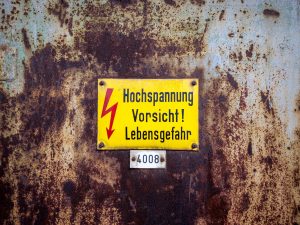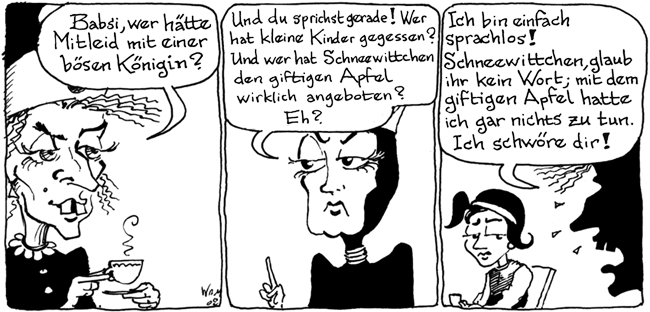Die Wortbildung – Word Formation
As you may know, German is famous for its impressively long nouns. In order for you to speak German successfully too, it is helpful to learn various patterns of word formation (derivation) and compounding.
If you feel overwhelmed, just relax, and imagine how impressive you will sound at the next party when such beauties as these roll easily off your tongue …
| das Fussballweltmeisterschaftsqualifikationsspiel |
| die Vierwaldstätterseedampfschiffahrtsgesellschaft |
| der Donaudampfschiffahrtsgesellschaftskapitänskajütenklinkenputzergehilfe |
Learning derivational patterns and compounding in German is also a practical way to expand your vocabulary.
Derivation is the process of altering the original stems of words to form (i.e., derive) new words (by adding affixes) or new categories of words (e.g., an adjective from a noun or a verb).
Adding affixes (prefixes, suffixes, circumfixes) to word stems to form new words
Beispiel: sprechen (to speak)
| Adding a prefix | Adding a suffix | Adding a circumfix (prefix and suffix) |
||||||
| prefix | = | be- | stem | = | sprech | prefix | = | be- |
| original | = | sprechen | suffix | = | + t | suffix | = | -t |
| new word | = | besprechen | new word | = | sprecht | stem | = | sprech |
| new word | = | besprecht | ||||||
| discuss | you guys speak/talk | you guys discuss | ||||||
| die böse Königin | Was besprecht ihr? | What are you guys discussing? |
| Schneewittchen | Wir besprechen die Details von unserem Rechtsstreit; Heidrun verklagt Disney, denn Hexen werden da immer noch so einseitig dargestellt! | We are discussing the details of our lawsuit; Heidrun is suing Disney, because witches are still portrayed so one-sidedly! |
| die böse Königin | Ach, darüber möchte auch ich sprechen, Schneewittchen! Es ist doch höchste Zeit, dass man von der Gleichberechtigung aller Märchenfiguren spricht! | Aha, I would also like to talk about that, Snow White! It’s high time that we speak of equal rights for all fairy tale characters! |
| Schneewittchen | Eh … das muss ich mir überlegen. Ich bin nicht die beste Verteidigerin von bösen Königinnen. | Hmmm … I’ll have to think about that. I am not the best defender of evil queens. |
Changing word categories
Just as in English, there are several groups of endings that can help you expand your vocabulary by changing the way you use certain words.
For example, using the word (noun) Sprache, you can build at least 8 different new words:
| Sprache | noun, feminine | speech |
| sprechen | verb, infinitive | speak |
| Sprecher | noun, masculine | speaker, spokesperson, announcer |
| Sprecherin | noun, feminine | speaker, spokesperson, announcer |
| Sprechen | noun, neuter | the act of speaking |
| sprachlos | adjective (-less) or adverb | speechless/speechlessly |
As another example, here are the different words that can be formed from the verb verstehen.
| verstehen | verb, infinitive | understand |
| Verstehen | noun, neuter | the act of understanding |
| Verständnis | noun, neuter | understanding, sympathy |
| Verstand | noun, masculine | reason |
| Verständigung | noun, feminine | understanding, agreement |
| verständlich | adjective (-lich) or adverb | understandable/understandably |
| verständnislos | adjective (-less) or adverb | uncomprehending/uncomprehendingly |
| verständnisvoll | adjective (-full) or adverb | understanding/understandingly |
| verständig | adjective (-ig) or adverb | reasonable, sensible/reasonably, sensibly |
| verständigen | verb, reflexive (sich) | make one’s self understood |
| die alte Hexe | Babsi, ich habe halt Verständnis für deine Situation, aber sei verständig, wer hätte Mitleid mit einer bösen Königin? | Babsi, I have sympathy for your situation, I really do, but be sensible, who on earth would have sympathy for an evil queen? |
| die böse Königin | Und du sprichst gerade! Wer hat kleine Kinder gegessen? Huh? Wer hat Dornröschen umbringen wollen? Und wer hat Schneewittchen den giftigen Apfel wirklich angeboten? Huh? | And you should talk! Who ate little children, huh? Who wanted to kill Sleeping Beauty? And who really offered the poisoned apple to Snow White, huh? |
| die alte Hexe | Ich bin einfach sprachlos! Schneewittchen, glaub ihr kein Wort; mit dem giftigen Apfel hatte ich gar nichts zu tun. Ich schwöre! | I am simply speechless! Snow White, don’t believe her; I had nothing to do with that apple. I swear! |
Here is a quick overview of some of the endings you can add to words to create adjectives or adverbs, since in German, they both look the same. But do watch out for the different meaning! You can also use most participle forms of verbs as adjectives (die gebratene Hexe …, der vergiftete Apfel …, und so weiter).
| –bar | –ible/able | lesbar (legible) |
| –d | –ing | sitzend (sitting) |
| –frei | –free/-less | koffeinfrei (caffeine free) |
| –haft | –ous/-ly | fabelhaft (marvelous) |
| –ig | –y | missmutig (grumpy) |
| –isch | –ic | problematisch (problematic) |
| –lich | –ual | pünktlich (punctual) |
| –los | –less | pietätlos (irreverent) |
| –sam | –y | langsam (slow/slowly) |
| –voll | –full | geheimnisvoll (full of secrets, mysterious) |
Nouns can be formed with a handful of suffixes (e.g., –heit, –keit). These are the most common suffixes. This list is not meant to be exhaustive (although it may very well be exhausting):
| –chen/-lein | diminutive suffixes | Mädchen (little girl) |
| –er | masculine person | Zauberer (magician) |
| –in | feminine person | Zauberin (female magician) |
| –heit | –ness | Gesundheit (health) |
| –keit | –ity | Ewigkeit (eternity) |
| –nis | –ing | Verständnis (understanding) |
| –schaft | –ship | Bürgerschaft (citizenship) |
| –tät | –ity | Formalität (formality) |
| –ung | –ing/-ity | Gleichberechtigung (equality) |
Nouns can also be formed by making the infinitive into a noun (always neutral).
| sehen (to see) | das Sehen | the act or concept of seeing |
| lesen (to read) | das Lesen | the act or concept of reading |
Or by shortening the infinitive … Sometimes the vowel will change; the noun will almost always be masculine.
| streiten (to argue) | der Streit | argument |
| sprechen (to speak) | der Spruch | saying, such as a proverb or set expression |
Compounding is the process of joining two or more words together to form new words; in the case of the German language, the more the merrier (just read Mark Twain’s A Tramp Abroad).
The difference between German and English compounds lies in the way they are written. While English compounds tend to be written as separate words, German compounds tend to be written as one (very) long word.
Here are some examples for the word sprechen; see if you can identify the components of the new compound nouns, adjectives, etc.:
| die Sprechstunde | office hours, consultation session |
| die Sprachwissenschaft | linguistics (language science) |
| die Sprachschule | language school |
| der Sprachunterricht | language instruction |
| sprachbegabt | linguistically talented |
| das Sprichwort | proverb |
| die Sprachkenntnisse | language skills |
German is a so-called ‘left-branching’ language, so compounds are created (and thus, are to be deciphered) backwards. In other words, the key information is the last component of the compound, with the preceding elements adding further information as you go leftwards. The gender of the compound noun, as a result, is determined by the last element of the compound:
| die Lebensgefahr | => die Gefahr (danger) + das Leben (life) + ‘s (possessive) | ergo: danger of one’s life |
| die Altbauwohnung | => die Wohnung (apartment) + der Bau (building) + alt (old) | ergo: an apartment in an old building |
| das Schlüsselerlebnis | => das Erlebnis (experience) + der Schlüssel (key) | ergo: a key experience (one that can alter one’s life) |
| die Straßenbahnhaltestelle | => die Stelle (spot) + halten (stop) + die Bahn (track) + die Straße (street) | ergo: where the streetcar stops (tram stop) |



You will encounter many a compound noun in German texts, and many of these will not be in your dictionary. Don’t lose heart, decipher them backwards and hope for the best. 🙂 Eventually you will get a sense for these, and you will be able to understand them readily. Until then, enjoy the puzzle!


